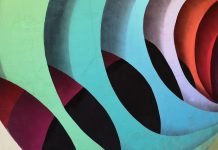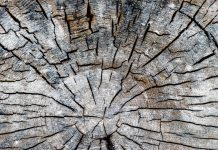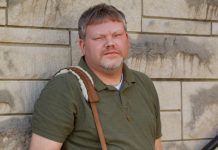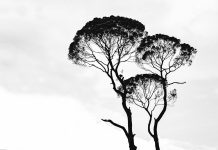It was the day after the elections. The sky above the city was overcast and witches left black streaks in the air. Intermittent rains led to floods and mudslides, while herds of thugs trawled the meadows with their knuckles.
Not that any of this was explicitly my business, since it practically screamed the contrary right up in my face, and head- butted me into a limpid blue limbo where the silence fell like milky pearls from god’s lips just out of sight in the vastness.
There used to be a way of distinguishing travelling from staying home. Now, only unfamiliar territory remains. The bright weft unravels, a thread to follow through obligation and loss as these cast a shadow of fellowship and love.
I am trapped in my house by tenderness, my garden of loss, the adze of my solitude. Strangers’ bodies taste like daybreak, like panic. Oh my bitter soul, emptied by desire.
Even such tinges of touch can be savored, but only as a slipping away, as a way of leaving off while ill at ease, a kind of roiling into steam above the fervor. At times, pain is a curtain pulled over everything.
But time just continues, the minutes wear on somehow. Diminished surely, but still in motion. The dance, pushing between and through the other bodies in a burst of animus until you find yourself on a bench, under a tree, with a can of pop in one hand, surveying the moldy ruins with a certain élan, letting the tilt of the afternoon illumine the particulates floating beneath the clouds.
Dissipation is inevitable given the flatulent nature of living, of the biblical finality of our expulsion from the intestinal garden. And certainty is not to be found in such gassy environs. So, I was not entirely sure whether I was waiting for someone or not on that bench in the perpetually post-bellum park near downtown coming on sunset at the end of things.
That someone did, in fact, show up eventually shows that knots and bows are somehow naturally drawn to loose ends billowing in the breeze.
I won’t lie, when I saw your face between the trees, I sensed that my burden became lighter and that my release was more imminent. The expression on my face became somehow less rigid as you approached, and by the time you were sitting beside me on the bench I found myself able to extract a flavor from each moment that washed over us.
But this had none of the tension of an assignation, and it was nice to have some company with whom to pass the while, watching the wrap-up.
I showed you some small pieces of cardboard on which I had painted things. Without fail, in each case you asked what the bare cardboard had looked like and whether I had painted other images there before painting over them with the current image. You said that even if we were talking about the ocular, you were still more interested in what the object was, rather than merely what it appeared to be. I took a sip of my pop and thought that you were very metaphysical, effervescent even. I didn’t like thinking of life as something that had to be extracted from a wrapper.
Your child had been very ill and at that point was still getting better. We spoke of this obliquely, and you told me about the possibility of moving to the coast, where it was warmer and the air was better.
Helicopters had been flying overhead all day. People passing by could not help but occupy their minds with this or that.
Time and a half came about by dragging the future into the present, by expectation. Now became a running around to consume itself, impatience as a kind of off-kilter lacking, uprooted, decimal.
Without fail, I have been wrong. In every moment, in every place, and almost in every way. Being wrong has been a necessary part of the process that defines where and when I am.
The sightline along one edge of the park was concealed by a billboard, across which extended a giant grin denoting a kind of shiftless optimism. Someone sold fresh air in bottles at a small stand.
When I lifted my noggin from my pillow this morning, my bookish impulse was to locate and then get to the park. I expected to find a world of things of which I would be one. Things would be what they were. But then I saw how the boulevards that fed the park filtered the current, how someone was whispering in my ear. Someone was asking me to choose between thinking that things are what they do and thinking that things are backed by some inscrutable identity. Now the billboards had converted the park into the smooth interior of a box. You told me that the only way to leave this park, this garden, behind, was to find a way to believe anew in time. Something had to be able to happen so that things might be altered somewhat.
I sit on my bench. I take another gulp of pop. I intuitively estimate the vast number of environmental and internal physical coincidences necessary for me to emotionally mirror the placid surface of the park’s cement lagoon, even for a few minutes, and I am diagnosed by the afternoon breeze. I see that my condition most resembles that of the contents of a can of aerosol. My prognosis can hardly be said to be less heartening, that is, to toxically disperse, to fill uneasily the enclosure that has been sealed around me. It occurs to me that that the phrase getting better is always only temporarily true.
The English word “turd” is an example of an unassailable lexical particle. Like its material counterpart in the space/time continuum, its abrupt presence, in a discourse, is utterly convincing, being both succinct and distinct simultaneously. And while we may ask, “did he say turd?” as we ask “is that a turd?”, nonetheless we always prepare ourselves for the certainty of such an eventuality.
But even the turd, with its power to make us recoil, is not immovable, cannot claim a stationary perspective. Sooner or later, as the saying goes, something will move it along, the rain, a beetle, a careless shoe. So too, am I dislodged from my bench by a swarm of school children that rise over the small hillock behind me. Their noise is like a fetid smell that spreads out before them.
Hurriedly passing between the tepid, where they amassed upon the rolling mounds like shrubs, set and easily evaded, distracted, perpetually mourning consequence. I refuse to sacrifice movement to conclusions. Even the stars are awhirl.
As I try to advance, pass through to something else, move into time passing and so toward something happening, I have the sensation of reality receding away from me. Versions of the moment trying to assemble itself tip back like dominoes to the horizon. Trying desperately to get a dial tone, to start over, to get back to a beginning before all the white noise and interference began unraveling around me. I hang up and try once more, yet here again the world picks up. I am beginning to think that what I call the world is nothing more than a bad connection. All around a bell throngs, and currents of purposeful wandering stream past. This is what it is to stroll away in the wrong direction, to take step after melancholy step, leaving the bursting miracle behind forever.
To read more articles/stories by the same author click here
About the Author
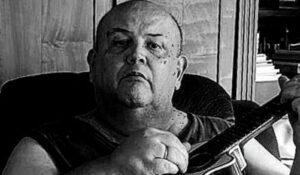 The son of Colombian parents, George Mario Angel Quintero was born in 1964 in San Francisco, California, where he spent his first thirty years. He studied literature at the University of California, and was a Wallace Stegner Fellow at Stanford University. Under the name George Angel, he has published poetry, fiction, and essays in English. Since 1995, he has lived in Medellin, Colombia, authoring seven books of poetry, and three books of theater plays all in Spanish under the name Mario Angel Quintero. He continues to write and publish in both English and Spanish. He is also a musician, a visual artist, and a theater director.
The son of Colombian parents, George Mario Angel Quintero was born in 1964 in San Francisco, California, where he spent his first thirty years. He studied literature at the University of California, and was a Wallace Stegner Fellow at Stanford University. Under the name George Angel, he has published poetry, fiction, and essays in English. Since 1995, he has lived in Medellin, Colombia, authoring seven books of poetry, and three books of theater plays all in Spanish under the name Mario Angel Quintero. He continues to write and publish in both English and Spanish. He is also a musician, a visual artist, and a theater director.



